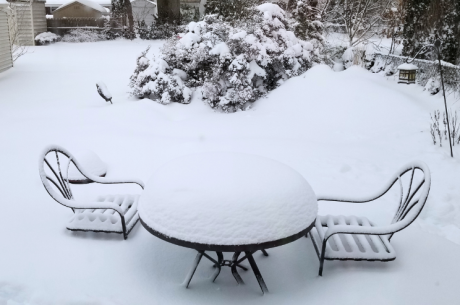Holiday Kitchen Safety Tips You Can Use All Year
Thanksgiving is a time for gathering and feasting, but it’s also the peak day for home fires and home fire deaths, with cooking being the most common cause of the fires. With multiple dishes cooking and distractions everywhere, the risk of fire increases.
To keep your home and family safe, we have tips for:
The kitchen fire safety tips you use during Thanksgiving can protect your home year-round. Here are essential fire prevention tips to help you cook safely, no matter the occasion.
“Cooking was, by far, the leading cause of all Thanksgiving Day fires in residential buildings at 74%…” ~ U.S. Fire Administration
Stay Attentive to Prevent Cooking Fires
It’s finally Thanksgiving! The turkey is in the oven, and the side dishes are on the stove. The relatives are arriving, and everyone is eager to catch up. Amid the laughter and conversation, it’s easy to forget about the gravy simmering on the back burner.
Your pot boils over onto the burner, and a small fire breaks out on the stovetop. Thankfully, you react quickly. You turn off the burner, move the gravy and smother the fire with a pot lid. The fire is out, and the gravy is saved, but this incident is a small reminder that kitchen distractions can easily turn into a dangerous situation.
- Never Leave Cooking Unattended
Unattended cooking is the leading cause of home fires and injuries. Whether frying, grilling, or using the stovetop, always stay in the kitchen while cooking. Deep frying, in particular, poses a high risk. If oil gets too hot, it can ignite easily. - Use Timers and Smart Alerts
With so many dishes to coordinate, especially during holidays, it’s easy to get distracted. Use timers to remind you when food needs checking. Setting phone alarms or using smart devices can help you stay on track and prevent food from burning, which can lead to fires. - Wear the Right Clothes
Loose clothing can catch fire easily when cooking. Always roll up your sleeves and avoid wearing loose or dangling fabrics when working near a stovetop or open flame. - Stay Sharp in the Kitchen
Limit the liquor and other things that can dull your focus. It’s tempting to enjoy a glass of wine or a cocktail while cooking, especially during the holidays, but save your celebrating at the right time and place – out of the kitchen.
Maintain a Safe Cooking Environment
Thanksgiving is a juggling act, trying to heat up everything at once. You move the cheese dip off the burner and set it down next to the stove. Then, you check the rolls in the oven. When you look back up, the oven mitt you used to move the liquid cheese is on fire.
You quickly extinguish the fire, and only the edges of the oven mitt are crispy – not the whole kitchen. You add it to your collection of burned hot pads. By now you should know to keep flammable items away from the heat.
- Keep Combustible Materials Away
Items like dish towels, oven mitts, tea towels, paper towels, and food packaging can easily catch fire if placed too close to the stove or oven. Even wooden utensils can catch fire if left near a heat source for too long. Make sure these items are stored away from heat sources. - Clean As You Go
Grease and food spills can ignite if they come into contact with heat. Clean your stovetop, oven, and counters regularly, especially after cooking with oil, to prevent grease buildup. A clean kitchen is a safer kitchen. - Keep Your Kitchen Organized
Clutter can increase the risk of accidents and fires. Keep your kitchen tidy by organizing tools, keeping counters clear, and making sure nothing flammable is near heat sources. - Minimize Cords and Electrical Hazards
Avoid using extension cords in the kitchen. They can cause tripping hazards and potential electrical fires. Plug appliances directly into wall outlets, and keep cords away from hot surfaces. - Follow Manufacturer Instructions for Appliances
Using appliances incorrectly can lead to fires. Always follow the manufacturer’s instructions for your stove, oven, and other kitchen appliances to avoid hazards.
Your Turn – Look around your kitchen—are flammable materials like paper towels or oven mitts too close to the stove? Organizing your kitchen is a simple way to reduce fire risk.
Safe Cooking Practices
- Be Careful with Boiling Liquids
If spilled near a flame, boiling water or hot oil can easily splatter, causing burns and potential fire. Always stir away from your body, and use long-handled utensils for safety. Keep pot handles turned in toward to prevent accidental knocks. - Use the Right Tools for the Job
Never use metal utensils to retrieve food from toasters or other electrical appliances. Always unplug the appliance first, and use wooden or heat-resistant tools to avoid sparks or fires. - Turn Off Appliances When Not in Use
After you are finished cooking, always turn off the stove, always turn off the stove, oven, and any other appliances to prevent fires caused by overheating or electrical malfunctions. Double-check that everything is off before leaving the kitchen to minimize fire hazards.
Supervise Kids and Pets in the Kitchen
As hard as you have tried to train your pup to stay out of the kitchen, the smell of the turkey is just too much. He plops down by the fridge. You let him hang out in the kitchen – just this once, since it’s a special occasion.
He’s a good boy, patiently waiting for turkey bits to fall his way. Then, as you try to make room on the counter for the boiling pot of green beans, you step on his tail, and you, the dog and the scalding food end up on the floor.
Luckily, no one got burned. You’d never forgive yourself if you hurt your loyal hound or one of your kids. It’s best to keep the kids and pets amused elsewhere and out of the kitchen.
- Create a “No-Go” Zone
Children and pets are especially vulnerable to kitchen hazards. Plus, they can also cause distractions that lead to accidents. Establish a pet and kid-free zone to keep them away from hot surfaces, cooking appliances, and sharp tools. This reduces the chance of them accidentally knocking over pots or getting too close to a stove and prevents you from tripping over them while carrying hot food or sharp utensils. - Teach Fire Safety to Children
Help children understand fire safety and the dangers of hot surfaces and fire. Encourage them to observe from a distance and explain why they should never touch a hot stove, oven, or cookware.
Fire Safety Precautions and Preparedness
We made it through the meal with no accidents. Yay! But did you remember to turn off the stove after you oiled and dried your cast iron pan? The screech of the smoke alarm was a big buzz kill, jarring you out of your food coma, but it saved the kitchen!
- Install and Check Smoke Alarms
Smoke alarms are critical for early fire detection. Install them on every level of your home, particularly near the kitchen and bedrooms. Test smoke alarms monthly and replace the batteries every six months. - Keep a Phone Nearby for Emergencies
Have a phone nearby while cooking so you can quickly call 911 or your local fire department in case of an emergency. Make sure your family knows where to find the phone and how to make emergency calls. - Have an Emergency Plan
It’s essential to have a fire evacuation plan. Make sure everyone in your house knows what to do in case of a fire. Practice the plan regularly so everyone is prepared. - Install Stove Guards or Cutoff Devices
Consider installing a stove guard or cooker cut-off device to prevent unattended cooking fires. These devices can automatically shut off the stove if it detects a fire or is left on too long.
Be Prepared for Cooking Fires
- Keep a Fire Extinguisher Handy
A fire extinguisher is your first line of defense in case of a fire. Ensure one is kept in an accessible location in your kitchen. Know how to use it effectively to stop small fires before they spread. - Know How to Smother a Fire
Never use water for grease fires—it can make the fire worse. Smother flames with a metal lid or use baking soda or salt. Keep these materials close by when deep frying or cooking with oil. - Check Electrical Appliances and Wiring
Regularly inspect your kitchen appliances, including cords and plugs, for signs of wear and damage. Faulty wiring can spark electrical fires, so make sure to replace any damaged equipment.
Your Turn – You have a fire extinguisher, but do you know how to use it? Is it the right type for a cooking fire? Before the holidays, take a few minutes to make sure the fire extinguisher is in good working order and know how to use it!
Celebrate Safely: Keep Your Kitchen Fire-Free This Thanksgiving and Beyond
Thanksgiving is one of the busiest times in the kitchen, but the fire safety habits you practice during the holidays can protect you all year.
You can drastically reduce the risk of kitchen fires by staying attentive, preparing for emergencies, and keeping a safe and organized cooking space. Start using these kitchen fire safety tips today to keep every meal safe and worry-free.
Brought to you by PuroClean of Matawan, your trusted local partner for professional mold, water, fire restoration, and biohazard cleanup services. We’re committed to helping homeowners and businesses recover quickly and stay prepared for the future.
Cover Photo: Christian Hoy with giant turkey



